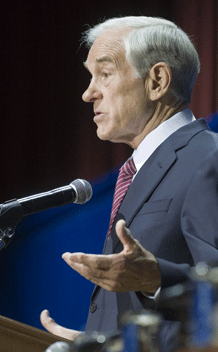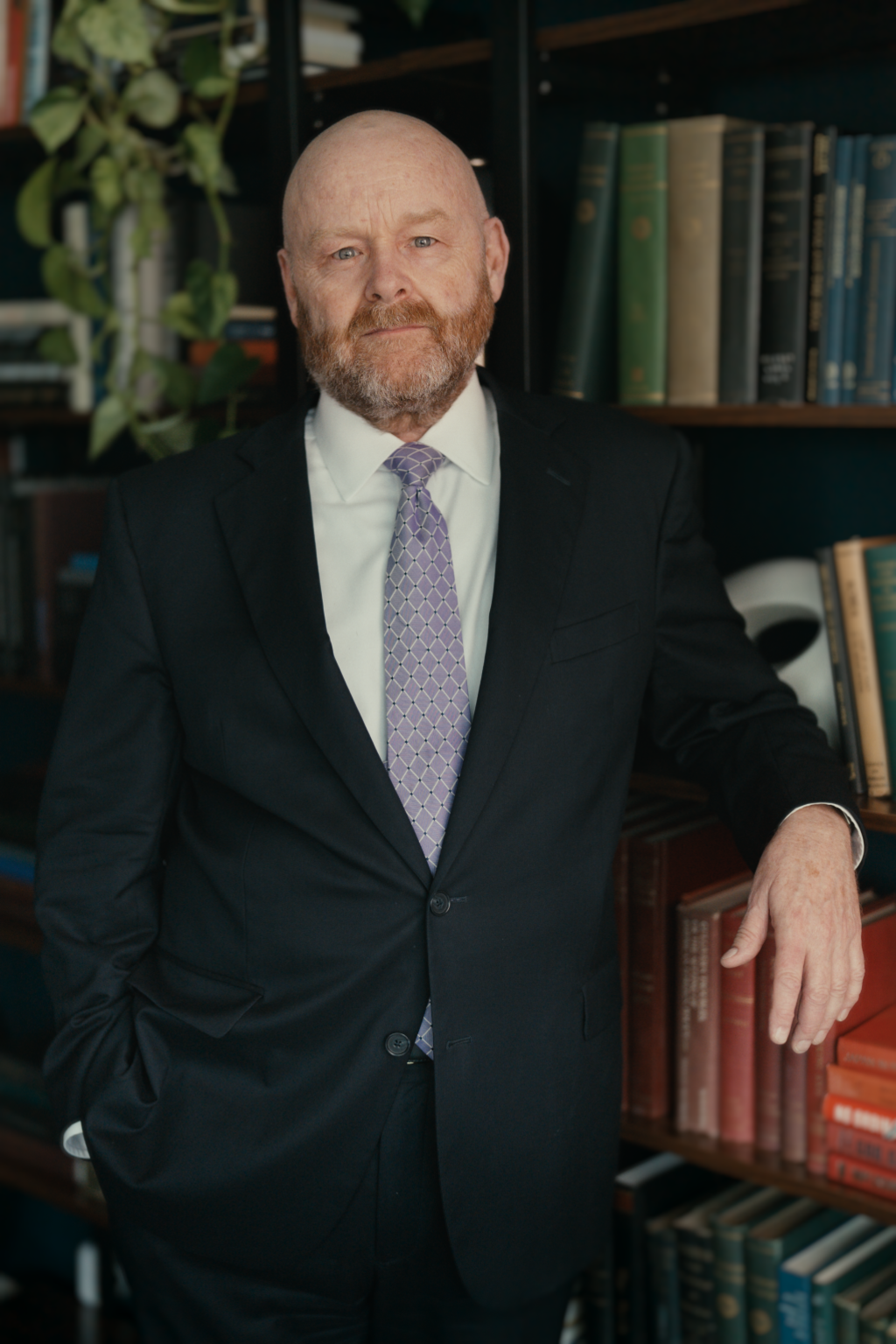Campaign 2012: Hello Ron Paul, GOP Presidential Candidate
By experts and staff
- Published
Experts
![]() By James M. LindsayMary and David Boies Distinguished Senior Fellow in U.S. Foreign Policy
By James M. LindsayMary and David Boies Distinguished Senior Fellow in U.S. Foreign Policy

The third time is the charm. That’s at least what Ron Paul hopes. An unsuccessful presidential aspirant in 1988 and again in 2008, he announced today in Des Moines, Iowa today that he is forming a presidential exploratory committee. If successful, Paul would be the first medical doctor to sit behind the Oval Office desk. He would also be the first sitting member of the House of Representatives since James Garfield in 1881 to jump directly to the White House.
The Basics
What Supporters Say. One of Paul’s current rivals for the 2012 GOP nomination, Gary Johnson, supported Paul’s presidential run back in 2008:
I am endorsing Ron Paul for the Republican nomination for President because of his commitment to less government, greater liberty, and lasting prosperity for America. We are at a point in this country where we need to reduce our dependency on government and regain control of our future. To this end, Ron Paul will bring back troops, end the War in Iraq, and will strengthen the U.S. dollar and the economy. For these reasons and more, Ron Paul has my support, respect, and vote
Rev. David Paul, a Lutheran minister, attests to his brother’s tenacity:
He doesn’t change his principles. No matter what comes up or what may even be helpful to him, he wouldn’t do it without reason…he’s able to hold his own. He doesn’t seem to have any fear, and he knows what he believes. That’s the point.
What Critics Say. Political strategist Dick Morris holds Paul in low regard:
I strongly oppose Ron Paul. I think he’s horrific. He wants us to end the War on Drugs. He wants us to end the War on Terror.
Political analyst Charlie Cook thinks that Paul is too rigid to win:
Principles have a price. Ron Paul has a rigid, inflexible ideology, and it has undermined his effectiveness.
Stories You Will Hear More About. Paul met his wife, Carol Wells, in high school; he was her date to her sweet sixteen. The couple married in 1957, during Paul’s senior year of college. The couple now has five children, eighteen grandchildren, and one great-grandchild.
During medical school, Paul read Friedrich Hayek’s classic, The Road to Serfdom, and realized that economics was his true passion. Paul writes of his economic epiphany:
Although the works were magnificent, and clarified many issues for me, it was more of a revelation to find intellectuals who could confirm what I “already knew”—that the free market is superior to a centrally planned economy … It is only with full assurance gained from Austrian economics, and the example of Mises’s character, that I am able to tolerate the daily circus of Congress.
Paul became a disciple of Hayek’s mentor, Ludwig von Mises, who favored complete free-market capitalism. Paul adopted Mises’s belief that government-printed money leads to gyrations in the economy—which economists call the business cycle and mostly see as unavoidable—and that the only way to prevent them is to return to the gold standard.
Once he finished his medical internship, Paul spent two years working as a flight surgeon with the U.S. Air Force, rising to the rank of captain. He later moved to Texas, where he started up his own obstetrics and gynecology practice. But the lure of politics was powerful. After President Richard Nixon imposed wage-and-price controls in an attempt to curb inflation in 1971, Paul decided to enter the political arena:
I decided that someone in politics had to condemn the controls, and offer the alternative that could explain the past and give hope for the future: the Austrian economists’ defense of the free market.
He ran for Congress in 1974 with a campaign message of “Freedom, Honesty, and Sound Money” against Democratic incumbent Bob Casey and lost. However, Casey left office a year later to work for the Ford administration, and Paul won the election to replace him.
Paul disagreed with his ideological idol Mises on one point: that all politicians will inevitably give in to “pressure groups.” Determined to prove Mises wrong and cling closely to his values even once in elected office, Paul voted against anything not explicitly authorized in the Constitution, earning himself the nickname “Dr. No.” After years of being excluded from House leadership positions, Paul became the chairman of the subcommittee on domestic monetary policy.
Paul ran on the Libertarian Party’s 1988 presidential ticket against George H.W. Bush and Michael Dukakis. He received 400,000 votes, or 0.47 percent of the popular vote. Paul ran for president again in 2008, this time as a Republican; he lost every individual primary he entered. Perhaps the tide is changing for Dr. No, though. He won the Conservative Political Action Conference’s presidential straw poll last year and again this year.
Paul in His Own Words. Paul proudly takes principled stands on issues, even when they make others unhappy:
Once you say, ’Well, you know, we live in the real world and sometimes you have to give in a little bit,’ then you’re never yourself, you’re never your own person, and they’ll badger you to death. So it’s much easier for me to follow a set of principles than fussin’ and fumin’ on knowing exactly when you’re supposed to throw in the towel.
Paul is known for one-liners that make great bumper stickers. The funniest, though not necessarily the fairest, might be:
Don’t steal--the government hates competition!
The Campaign Book. Last week Paul released his newest book Liberty Defined: 50 Essential Issues That Affect Our Freedom. It explains his stance on what he calls the fifty most important issues of our time. Paul isn’t a first-time author. His other books include End the Fed, The Revolution: A Manifesto, and The Case for Gold.
Foreign Policy Views. Paul wants to return to the policy of nonintervention that guided American foreign policy for most of the nineteenth century. He, like most non-interventionists, does not like the term “isolationism”:
Nonintervention simply means America does not interfere militarily, financially, or covertly in the internal affairs of other nations. It does not mean that we isolate ourselves; on the contrary, our founders advocated open trade, travel, communication, and diplomacy with other nations.
Regarding America’s wars, he warns:
No matter how much you love the empire, it’s unaffordable.
Paul wants out of Iraq, Afghanistan, and Libya. He opposed the Iraq War from the start. He blamed the decision to invade on:
a dozen or two neocons who got control of our foreign policy.
Although Paul voted back in 2001 to use force in Afghanistan and to fund military operations there, he now says that the authority and funding have been “misused.” In the months after 9/11, he disagreed with most of his congressional colleagues on key pieces of counterterrorism legislation; he was the only House member to vote against the Financial Antiterrorism Act, and he was one of only three Republicans to vote against the USA Patriot Act. And he made waves during a 2007 presidential debate when he said of Al Qaeda:
They attack us because we’ve been over there. We’ve been bombing Iraq for ten years.
Paul wants to pare back both defense spending and foreign aid spending:
I would cut a lot of the spending overseas. I mean, we have too much stuff. And why do we support Obama going into Libya and all this stuff? It is just way too much. You could cut a lot.
Target Audience. Paul appeals to the voters with libertarian views, whether they belong to the GOP or not. The New York Times noted that his support during his 2008 campaign was
a coalition that even [Paul] recognizes does not always stand together: young people who liked his advocacy of greater civil liberties and the decriminalization of marijuana; conservatives who nodded at his antidebt message; and others who agree with his opposition to the Iraq war.
Paul’s reputation as a deficit hawk will help him with Tea Partiers, though some of them might wish that his son, Rand, Kentucky’s junior senator, was on the ballot.
Major Strengths. Government red ink has almost everyone worried, and Paul has impeccable credentials when it comes to scaling back the size of government. Supporters cite his prescience in warning about looming problems such as the housing bubble, Fannie Mae, and cheap credit. The Atlantic wrote:
Today, Paul looks increasingly vindicated. Not only did he warn of the crisis, he has also set the pace for his fellow Republicans in responding to it, although few credit him for this. Paul was preaching fiscal austerity and draconian budget cuts when his colleagues were helping George W. Bush add an expensive new Medicare drug entitlement.
Paul learned a few things from his 2008 campaign, including how to raise money and raise it fast. His preferred technique is “money bombing,” a term he coined for using 24-hour energetic stints to raise money online. In the lead up to the 2008 election, he broke the record for the most money raised in a single day for a presidential campaign with $4.3 million collected from 37,000 online donors. During a 2011 President’s Day money bomb, he raised more than $700,000 in 24 hours.
Major Weaknesses. Social conservatives are critical in two of the three early GOP nominating contests, Iowa and South Carolina. Paul’s passion for issues like the gold standard doesn’t do much for them.
Although Paul’s focus on changing the economy coincides with America’s rising concern over the budget and national debt, it might not be enough to matter. The New York Times suggested:
For all the ways the Tea Party movement echoes Mr. Paul on fiscal issues, it is not clear such support would carry over into a presidential campaign. Even many Tea Party conservatives are not on board with Mr. Paul’s beliefs about scaling back the United States military worldwide, and some of his supporters look on the Tea Party movement with some disdain. Given the influence the Tea Party could have in the race, it is likely that Mr. Paul will have to compete with several other potential candidates to carry the mantle of the movement.
Paul also suffers from the fact that he has run before and came nowhere close to winning. As a result, even voters who like what he stands for may dismiss him as unelectable. It won’t help that Paul will be seventy-seven-years-old come January 20, 2013.
Paul in Depth. The Atlantic explains why Paul has become the “intellectual godfather” of the Tea Party. Esquire details Paul’s views on the perversion of the Constitution that brought America where it is today. A November 2007 article in Time explains Paul’s ability to appeal to a range of disaffected voters. You can also watch his speech at the 2011 Tea Party Patriots Summit:
Click here to view this video on YouTube.
Odds for Winning the Nomination. Essentially none. Paul has a passionate following, but it’s too small to carry him to victory. In March, Gallup listed Paul as having 6 percent of support from Republicans and Republican-leaning independents. 1800 Sports lists Paul last, at +2000 odds.
